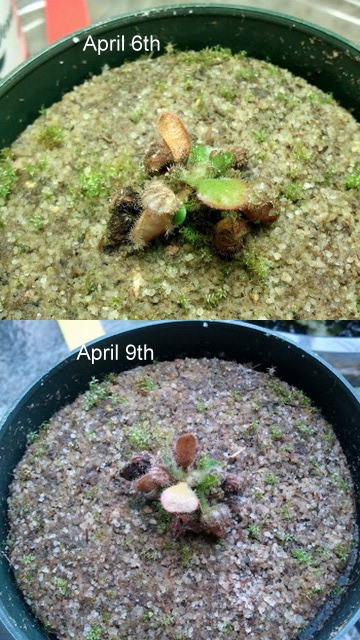Question
 Cephalotus folliculari
Cephalotus folliculari
Hi,
I recently purchased a Cephalotus follicularis through your website. The plant arrived in great condition well damp soil. I left the plastic top of the container it was shipped in (loosely) so as to acclimate it to my area, Southern Louisiana. I purchased the plant on March 19 with it arriving promptly on March 21st. Attached is a photo of the current plant. All pitchers have turned brown and the two non-carnivorous leaves have recently browned as well. This began about 1-2 weeks after the order arrived. I top watered the plant every couple of days when the soil would begin to dry, but never fully.
I had a few tropical carnivorous plants growing under a 40W 2600 lum CFL shop light. The humidity has only recently etched back up to 70%+ so I have moved most plants outside, including the cephalotus in hopes more humidity will revive it.
I am puzzled as to what I have done wrong, I realize that the plant is more difficult to grow, but I'm not sure where I went wrong. Could you advise & is a) possible to save it or b) order a new plant?
Thanks
Thanks,
AnswerI know it's distressing to see this. However, your plant is simply undergoing an acclimation process. This is completely normal when its growing conditions change drastically. You're not doing anything wrong. Even for me, this could potentially happen if I were to get a seedling from another grower.
In winter, when light levels are low and temperatures are cooler, Cephalotus will produce flat non-carnivorous leaves. In spring, when the light levels and temperatures increase, they are supposed to die off as the plant starts growing pitchers again. Because your location is much warmer and brighter than ours, your plant is showing the change much more dramatically. Again, this is completely normal. Even the small pitchers from the previous season will die off. This too is completely normal.
If you look at the center of your plant, you will see a small nub. This is a new pitcher forming. Cephalotus is one of the slowest growing plants, so you won't see any significant new growth any time soon. This too is completely normal.
Overall, your plant is fine and doing what is expected given its dramatic change in growing conditions. Even with a new plant, you will likely see the same results because of the differences in growing conditions at our nursery and at your home. Your current care is completely fine. If anything, the only thing I would say you didn't need to give your plant more humidity. I believe that Louisiana is humid enough. In fact, we purposely grow our plants in slightly lower humidity. In the summer, we can reach humidity levels as low as 15%! Plants will acclimate, but you have to give them the proper time to do so. You will need to be exceedingly patient. Cephalotus is not at all for the impatient grower. Your seedling, by the way, is at least 2 years old!
I know it's difficult to see these changes in your plant. I'm not sure what else I could say to ease your mind. One of the reasons why many growers fail in growing Cephalotus is that they baby the plant too much. They want it to grow fast like a sundew or Sarracenia. So they coddle the plant, changing it's growing conditions every week to find the magic bullet that will make it grow fast. In the end, they don't allow the plant to properly acclimate to its growing conditions and put too much stress on the plant. Too much stress from constant changes in its environment can exhaust a plant. All plants prefer stable growing conditions, and Cephalotus is no exception. Anytime you move your plant, you will need to give it 3-6 months before determining if those growing conditions have a positive impact or not. So you will need to be exceedingly patient. I can't emphasize this enough. Continue watering your plant and giving it lots of strong lighting, but by all means, pick one location and leave the plant there. By mid summer, you may see adult pitchers.
For more information about growing Cephalotus, watch Volume 3 of the Grow Carnivorous Plants DVD series.
http://www.cobraplant.com/DVD
Good growing!
Jacob Farin






